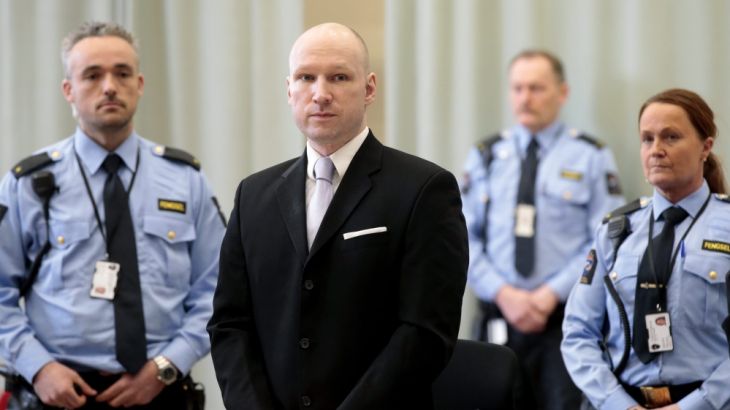Norway violated Anders Breivik’s rights, court rules
Keeping mass killer in “completely locked world” ruled a breach of the European Convention on Human Rights.

Norway has violated the human rights of mass killer Anders Breivik by keeping him in solidarity confinement in a three-cell complex where he can play video games, watch TV and exercise, a court has ruled.
The ruling found in Oslo on Wednesday that Breivik – who killed 77 people in twin attacks in 2011 – had been subjected to strip searches, had been woken up hourly by guards for long periods and that the authorities had done little to alleviate the effect of his isolation.
Keep reading
list of 4 itemsRussian playwright and director go on trial over ‘justifying terrorism’
US lawmakers slam ICC prosecutor’s Israel arrest warrant requests
Cohen faces more cross-examination as Trump’s trial enters final stretch
“The prohibition of inhuman and degrading treatment represents a fundamental value in a democratic society. This applies no matter what – also in the treatment of terrorists and killers,” judge Helen Andenaes Sekulic said in her ruling.
The state must pay Breivik’s legal fees of more than $40,000, the judge ruled.
Lawyers representing the state said they would consider whether to appeal.
“We are surprised by the verdict,” said Marius Emberland, one of the two lawyers representing the state.
Breivik took Norwegian authorities to court in March, accusing them of exposing him to inhuman, degrading treatment or punishment in breach of the European Convention on Human Rights.
Breivik protested against his isolation from other inmates and from outsiders who are not professionals. He also complained about cold coffee and microwaved meals that he said were “worse than waterboarding”.
READ MORE: Profile – Anders Behring Breivik
A survivor of the shooting at Utoeya island said the decision was shocking.
“I was surprised, and then angry and upset. To be honest, it was like being punched in the gut that the perpetrator won such a public victory,” Eskil Pedersen told state broadcaster NRK.
The tabloid VG newspaper said in an editorial published online on Wednesday that the decision was “wrong” because it trivialised the problem of torture in prison.
‘Could inspire others’
Another Utoeya shooting survivor said the verdict was a sign that Norway has a working court system, respecting human rights even under extreme conditions.
“It also means we have to take the ruling seriously and evaluate how we treat prisoners, what abuses they may suffer, and how we avoid abuse,” survivor Bjoern Ihler said on Twitter.
Breivik has three cells to himself in the high-security wing of Skien prison. The cells are equipped with video game consoles, a television, a DVD player, electronic typewriter, newspapers and exercise machines. He also has daily access to a larger exercise yard. He is allowed visits from family and friends, but has not received any except for his mother before she died.
The court that convicted him in 2012 found him criminally sane, rejecting the prosecution’s view that he was psychotic.
Breivik did not appeal against his sentence. He has been trying to start a fascist party in prison and reached out by mail to right-wing extremists in Europe and the United States. Prison officials seized many of those letters, fearing Breivik would inspire others to commit violent attacks.